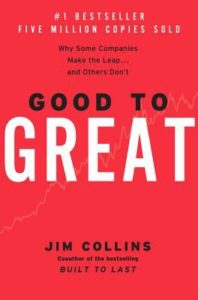
My undergrad degree was in Christian Ministries. I did not know it then but the major effused with the study and modeling of leadership. We read and discussed books by John Maxwell, Stephen Covey, Ken Blanchard, etc., leadership gurus at the time. We compared and contrasted the various popular leadership styles, noting the significant difference between managing and leading. But none of the literature at the time constructed a framework1 for delving into the emerging field of leadership studies until Collin’s Good to Great was published in 2001. Leadership studies is growing as an academic area of inquiry as evidenced by the burgeoning array of options available today, including the one yours truly is in. Thanks in part to influential Evangelical leaders and social critics such as Os Guinness, Christian leadership2 and courage has been highlighted as key in helping others, especially the church successfully navigate the current cultural upheaval happening today.
According to Collins, when it comes to identifying the most significant attributes that define a successful leader, the determiner that identifies one as a ‘Level 5’ leader turns out to be a combination of two character traits: humility and will.3 Admittedly, Collins initially refused to look at the data pointing to leadership as the decisive factor in an organization’s successful transition from ‘good-to-great.’ This was understandable as he did not want to be fall back on a simplistic, generic, all-encompassing explanation suggesting good leadership was behind every successful company, sort of like a ‘Leadership of the Gaps’ explanation, (i.e., the ‘God of the Gaps’ which simultaneously explains everything and nothing). He adds,
“We’re simply admitting our ignorance. Not that we should become leadership atheists (leadership does matter), but every time we throw our hands up in frustration—reverting back to ‘Well, the answer must be Leadership!’—we prevent ourselves from gaining deeper, more scientific understanding about what makes great companies tick.”4
In the end he had to give in and acknowledge the tremendous amount of data pointing to factors that could no longer be ignored—“the data won.” What they discovered was that executives from these ‘good-to-great’ companies possessed the character traits of self-effacing humility, plus the professional will to get things done that none of the other CEOs of the comparison companies possessed. Sure, the other CEOs did not lack skill and were successful in their own right, but it was at the expense of others. When research is done this way, a systematic collection and analysis of data before theories are constructed, it’s called Grounded theory. This method of research uses inductive reasoning in contrast to the deductive model used primarily in the scientific method. Grounded theory usually begins with a collection of data. Then a researcher tries to make sense of the data by asking questions, much like Collins did by asking “Can a good company become a great company and, if so, how?”5 On the other hand a deductive model of research is more in line with the scientific community that begins with a theory, then and only then proceeds to collect data to prove or disprove the phenomenon under study. While Collins’ team did not explicitly name the particular methodology they used in their research, using grounded theory in this case turned out to be ideal.
Finally I want to point out the incredible parallel between Collins’ findings and Scripture. The first issue of The Theology of Leadership did not set out to define what is meant by ‘theology of leadership’ for reasons we are not privy to. However, may I suggest that the editors of the journal borrow from Collins work as a template for constructing a theology of leadership framework that could provide space for data collection and analysis of items of leadership found in the Bible. I’m confident much can be learned from studying the leadership styles of some of the great leaders in the Old and New Testament and how humility and their will to do God’s bidding play a part in their mission. One of the striking similarities between Collins’ discovery and God’s idea of leadership has to do with humility. First of all we do have a model in Jesus for who can deny the cosmic condescension in Philippians 2:8? Some of the individuals God chose to lead were not humble but were made humble like Joseph, Samson, Nebuchadnezzar. Certainly the apostle Paul had to experience vulnerability and depend on others after God struck him on his way to Damascus before God could use him to lead the Gentile church.
Psalm 149: 4 says that God crowns the humble with victory. Humility. Could this really be one of the most uncelebrated key factors to successful leadership? It appears so and I am looking forward to future case studies affirming this.
- Good to Great to Gone. Google Books. Accessed September 12, 2019. https://books.google.com/books/about/Good_to_Great_to_Gone.html?id=JS2o-o99PB4C&printsec=frontcover&source=kp_read_button#v=onepage&q&f=false.
- Os Guinness. Renaissance: the Power of the Gospel However Dark the Times. (Downers Grove, IL: IVP Books, 2014), 98.
- Jim Collins. Good to Great: Why Some Companies Make the Leap and Others Don’t. (New York, NY: Harper Business, 2001), 22.
- Ibid.
- Ibid., 3.






